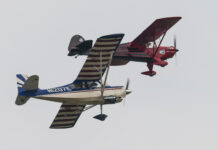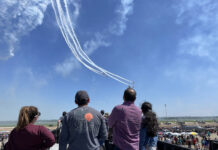When Eddie Van Halen’s legendary rock band hit the big time, they started encountering problems because show promoters weren’t reading his contract. So, he inserted a few clauses that would tell him immediately on arrival if his contract had been read.
The most notorious clause was a requirement for M&M candy in the dressing rooms, but then he stipulated that there could be no brown ones. If he arrived and found brown M&Ms in the dish, he knew the promoter had not read his contract and the show would not go well. He would demand full payment and refuse to perform, sometimes trashing dressing rooms on the way out.
While there is no evidence of anything this extreme in the air show industry, many performer contracts are not adequate for the current air show environment. They are often not read by show organizers and it causes extra work for both sides. Few contracts have ever been reviewed by an attorney and many don’t contain the details that air shows need to meet a performer’s requirements.
Air show performer Rob Harrison, who is also a lawyer, says a contract should constitute a meeting of the minds. “For that to happen, there has to be a complete understanding of the terms by both sides,” he says. “Lack of detail is what is causing shows to have to write their own contracts, or create addendums to provide the specificity needed.”
“Contracts are necessary, but they don’t have to be daunting. They just need to be complete,” he says. His own contract is very precise regarding the volume of fuel and oil he needs. It specifies the type of hotel room required , and his rental car requirements. But, despite the fact that he includes those kinds of details, even he runs into problems with contract terms being ignored or overlooked. “It’s usually not a deal breaker, but often I have to sit down with show organizers to arrive at a satisfactory solution,” he said.
Harrison said one of the biggest deficiencies in performer contracts has to do with weather issues. Performers need to make sure there are contingency clauses so that both parties understand what happens if a performer has to arrive early or stay later than planned due to weather. Who pays for the hotel rooms? Who pays for hangar space?” And, if performers arrive and weather causes the show to be cancelled, Harrison said contracts need to clearly state compensation expectations.
Performer Kyle Franklin says his contract started out as a single-page agreement, but has expanded to two pages based on some bad experiences. “I’ve been told my contract is harsh because my requirements are quite demanding, but they are the result of experiences I’ve had at different shows,” he said. An example is, what constitutes a hangar? His contract says it has to be of rigid construction with wood or metal walls, a concrete floor and a roof. “I arrived at one show where they parked us under a tent. We had a nasty storm blow through and nearly lost both airplanes. I reworked my contract after that and will no longer allow outside parking,” he said.
Franklin is also rigid about having a signed contract and a deposit in the bank before he leaves for a show, especially if it’s a show he’s never done before. “I can recall one show where I didn’t get the deposit until two days before I was to leave. Now my contract says I must have it at least 30 days out.”
Often, he says, he arrives at a show site and discovers they have missed some of his requirements. “Some oversights I can forgive, but some I’m a stickler over, including emergency response time. “Usually, I can work out any issues with the show organizer, but I won’t hesitate to adhere to the contract terms if safety becomes an issue,” Franklin said.
Performer Bob Carlton acknowledges he had no idea what he was doing when it came to contracts when he got into the business in the early 1990s. “I flew a lot of small shows on the basis of a handshake agreement, but very quickly developed a one-page contract just so I could keep track of what I was charging shows,” he said. Over the years, his contract has grown to four pages.
Just when he thought he had it nailed, he discovered that he had overlooked a key element. “I didn’t specify the number of media flights I would do and found myself doing ten a day, and that didn’t leave me much time to fly the show or rack my pyro.” Now, his contract even includes crew rest, especially for those days when there are early morning media commitments and a night pyro show.
Like most performers, Carlton won’t wave the contract in their face or become confrontational about issues, but he doesn’t hesitate to remind them if his terms are not met. Once he does that, things usually work out.
In some locations, air shows are sponsored by municipalities that have their own contracts they expect performers to sign. Those contracts are usually written by municipal attorneys who sometimes expect more than they should. “I was asked to provide a $20 million umbrella insurance policy once. Performers aren’t a paving project for a city street. We don’t need the same type of bonding or insurance liability limits that a contractor on a major street project would need.”
Long time performer Gene Soucy doesn’t have a problem with a late deposit or lack of a contract if it is an established show that he’s flown several times. Otherwise, he said, there has to be a deposit and a signed contract or he doesn’t go. And his contract includes a cancellation policy. “If a show cancels me within 90 days of the show date, I expect full payment because of the impact it has on my schedule.“
Soucy has been around long enough that he’s had his share of surprises. “I did a show that lost money and they couldn’t pay me. To make it up to me, they offered to balance my propeller for free for the rest of my life.”
Another pragmatist in the business is Ken Rieder of Redline Air Shows. After five years in the business, he has come to realize contracts really aren’t binding. “Contracts aren’t worth much because there is so little money involved that enforcing them isn’t worth the effort,” he said. Pushing a show too hard on contract terms can have consequences. “We argued with one show about a late payment and they never invited us back.”
Some performers feel badly about charging their full fee if a show is cancelled due to weather. Rieder says he was one of those, but no more. “We always include a weather cancellation clause in our contract. Sometimes, we are willing to work with them when something like that happens but, overall, we expect to be paid our full fee.”
Matt Younkin has learned his lessons well. He flies the twin engine Beach D-18 and has special requirements because he does both day and night routines. His contract contains explicit language about his needs, but he says not all organizers read it or comply with it. “Only about half the shows read my contract.”
Younkin has found that some shows look at the fee and consider the rest negotiable. “The most common problem is failure to provide me with the size vehicle I need and often it comes without a full tank of gas.” Younkin travels with three people and a lot of equipment, including spare parts, so a large vehicle is essential.
Air boss George Cline says his contract includes the best elements from others in the business because he has learned from their experience. “The first part of the contract identifies the service that I will provide, the dates I will work and the price, plus the amount and due date of a deposit.” It then goes into his transportation requirements, including who will be responsible for securing airline tickets. “I always specify that I want to travel to the closest major airport. If I need to pay my own air fare or rental car, I include the cost in my contract.”
Cline’s lodging requirements include being put up in a major hotel chain. In the case of a military show, he stipulates VIP accommodations on base. “I identify a king bed, non-smoking room and my own shower.” While that shower requirement may sound odd, Cline says a show once put him in a Bed and Breakfast that didn’t include a private shower and that was not acceptable.
Performer contracts are usually written from a performer perspective, but they cannot be viewed as one-sided documents. Show organizers have their own expectations that must be included, which is why many shows are starting to change the way they contract with performers. Phaedra Childers, Event Coordinator for Thunder in the Valley Air Show in Columbus, Georgia, says they now prepare their own contract, or at times an addendum to a performer contract, which both parties will sign.
“We may add a performer’s contract language to our contract, cross out anything we can’t meet and we will ask them to sign ours.” An example is hangar space. “We will have upwards of 50 airplanes at our show at times and we simply don’t have enough hangar space for every aircraft. Smaller airplanes will be hangared because we know they can be blown away, but there is a limit to what we can agree to do,” she said.
Another reason for writing their own contract is budget. “We are sticklers on fuel quantities, oil, and hotel rooms. We try to narrow it down and tell the FBO that, if a performer goes over the fuel limit, they need to talk to us before we will pay for it. We also hold performers to the contract for hotel space. If weather strands them, we will work with them, but we’ve also been burned by late arrivals and early departures and we’ve had to pay for rooms that weren’t used,” she said.
The Duluth, Minnesota air show is another that has gone to preparing its own contract. “We need a clear understanding of what we have to provide, but also need a clear understanding of what performers will provide. And sometimes a performer contract just doesn’t get us there,” said Ryan Kern, President and Founder of the Duluth Airshow.
Kern said they may sign the performer contract, but will prepare their own addendum to cover details like the arrival date, hotel specifics, and fuel requirements. “It’s not enough for a performer to say he or she needs up to 500 gallons of fuel, for example. We will cap it if necessary because we need to budget appropriately. We drill down to the details and make sure the numbers work on our end before we finalize an agreement.”
He added that they have had instances where a performer signs the contract, and later asks for 20 tickets for friends and family. But, he said — if it isn’t in the contract and agreed to ahead of time — he will let them know the tickets will be at their expense.
Another major shortcoming that Kern sees in performer materials is emergency contact information in the event of an accident. “Often, if something happens, we have no idea who to contact. So we have started asking for emergency contact instructions,” he said.
Kern says getting the needed information from pilots can be difficult at times, but, in the end, it is worth it. “I’m a firm believer that we are all on the same team. Nobody wants a contract issue at an air show. It is in both our interests to get it right the first time.”
Darcy Brewer at the California Capital Airshow says she has seen many inadequate contracts over time, but that she cuts performers some slack. “Any shortcomings in the contracts can be fixed by reaching out to the performers. We’ve had episodes where performers have needed more rooms than we had expected or needed more cars, and they have expected us to cover the cost without telling us in advance, so we go to work early and resolve this issue ahead of time,” she said.
In Brewer’s experience, most contract deficiencies are with new performers who simply don’t yet know their way around the industry. “Experienced pilots will often provide us with two documents. One is a contract and the other spells out their support requirements,” she said.
Beyond the normal language of fee and support requirements, Brewer said they look for something else as well. They want a performer who is willing to immerse themselves in the community. “We expect our performers to talk with the media, visit live radio and TV shows, and do whatever else we need to promote the show in the community. Most contracts don’t include that, but if they can’t do that for us then they won’t get hired.”
At the ShrinerFest Air Show in Evansville, Indiana, Nate Hahn says contracts for his show are always a back-and-forth process. “We work out contract issues and questions with the performers, then send them for legal review before we sign anything,” he said. “I’ve always liked detailed information. It saves me from having to go back to them, but that doesn’t always happen,” he said.
Hahn builds a spreadsheet that he sends to each performer to fill out. It includes arrival date, departure date, hangar space requirements, and any special needs or wants. “We will pay for hotels Thursday thru Monday, but — if they want to arrive early or stay late — it will be on their dime.” And it is his policy that if a show is cancelled due to weather, the show pays the full fee. But if the performer arrives and can’t fly due to a mechanical or other issue, then no fee will be paid unless there is language in the contract that we both have agreed to.”
One of the stickiest issues with any performer contract is liability insurance. Where once it wasn’t required, today it is standard. Performers normally have to be insured to at least one million dollars and the show must be named as an additional insured.
“When a show is named as an additional insured, it means that the performer’s insurance becomes the primary insurance in the event of an accident. “An accident that is not the fault of the show could damage the runway, or damage a nearby field or structure and the performer policy would cover the damage up to the specified limit,” said Susan Amey of Insurance Technologies and Programs.
While a performer policy would be primary in the event of an accident, if the limits of the policy are exceeded, then the air show policy kicks in. Amey said the current limit of one million dollars is standard across the industry and so far there has been no pressure to move that up. “We’ve seen a few instances where the limit has been exceeded, but not many.”
Amey says most performer policies are boiler plate. There are endorsements for flying for hire, for giving rides, for doing aerobatics and doing photography. When she writes a policy, she finds out what type of activities the performer will be doing and makes sure the policy will cover them.
She stresses one important aspect. “Everyone needs to read their insurance contract.” And whether it is a performer or a show, someone who understands insurance and contracts needs to review them before they are signed. “Policyholders often discover the shortcomings of their policies only after something goes wrong. Without reading it in advance, you may not be purchasing the coverage you thought you were purchasing,” she said.








